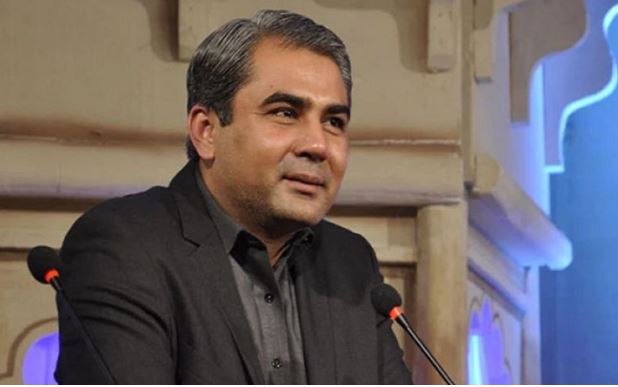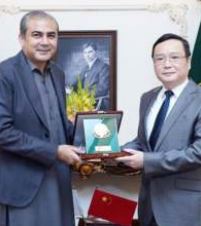
Unlike traditional caretaker chief ministers, Naqvi’s tenure exemplifies the power of effective leadership and innovative strategies in transforming public service delivery.
Kashif Rizwan
In the intricate tapestry of public administration, the role of a chief minister holds a pivotal position, shaping the trajectory of a region’s progress and the lives of its citizens. Amid the numerous caretaker chief ministers who have come and gone in Pakistan since the 1980s, Mohsin Naqvi has emerged as a unique and trailblazing figure.

His tenure has shattered the conventional mold of temporary leadership, ushering in an era of transformative governance and innovative strategies that have revitalized the province of Punjab. In the realm of public administration, one leader stands out for revolutionizing governance and empowering citizens: Mohsin Naqvi. Unlike traditional caretaker chief ministers, Naqvi’s tenure exemplifies the power of effective leadership and innovative strategies in transforming public service delivery. From austerity measures to digital advancements, Naqvi’s approach has reshaped Punjab’s landscape, prioritizing transparency, efficiency, and citizen-centric solutions.Assuming office in January of this year, Mohsin Naqvi was confronted with the formidable task of rejuvenating a province grappling with deeply entrenched inefficiencies, bureaucratic bottlenecks, and underwhelming public services.
The journey ahead was bound to be arduous, but Naqvi’s tenacity and dedication to serving the underprivileged strata of society laid the foundation for a paradigm shift in governance. His vision was crystal clear: to cultivate a state where every citizen enjoyed equitable access to quality services, and where the bedrocks of public administration were transparency, accountability, and efficiency.

The hallmark of Naqvi’s tenure has been his unwavering commitment to simplicity and austerity. A stance unparalleled in the annals of Pakistani politics, Naqvi chose to forego salaries, government accommodations, and customary privileges for his cabinet members.
This unexpected and bold move echoed his determination to lead by example and drive a culture of responsible and transparent governance. With this ethos at the forefront, he initiated sweeping reforms across critical sectors that impact daily life, such as health, education, law enforcement, and public services.

One of the most profound and empathetic steps taken by Naqvi was his recognition of the valor and sacrifices of the Punjab police force. The police, often at the frontline in the battle against crime, have made immense sacrifices to safeguard the lives and property of the citizens.
In a display of heartfelt gratitude, Naqvi sanctioned a substantial grant of Rs3.5 million to the family of a policeman who had laid down his life in the line of duty. This move reverberated with the spirit of empathy and compassion that defines his leadership.
Harnessing the potential of technology, Naqvi’s administration introduced digital platforms that facilitated seamless interaction between citizens and government departments. Through online portals, citizens could obtain licenses, permits, and essential documents without encountering the typical bureaucratic quagmire. This not only streamlined processes but also created a more transparent and accountable administrative framework that significantly curbed corruption.

Education, the cornerstone of societal progress, found itself at the center of Naqvi’s transformative vision. Recognizing the power of education to uplift and empower, he initiated programs that distributed laptops to students from remote and underserved areas.
These laptops not only provided access to knowledge but also inspired academic excellence. Moreover, a comprehensive overhaul of the education sector was undertaken, including curriculum enhancements, teacher training, and the establishment of modern educational facilities in overlooked regions. Naqvi’s efforts stood as a testament to his dedication to cultivating a generation equipped to lead Pakistan into a brighter future.
Aligned with the grand ambitions of the China-Pakistan Economic Corridor (CPEC), Naqvi’s government set aside over 0.1 million acres of agricultural land for corporate farming. This strategic move not only bolstered agricultural research and food security but also laid the groundwork for livestock studies aimed at enhancing productivity. Simultaneously, Naqvi championed the cause of farmers by proposing an increase in the minimum support price of wheat, providing a safety net against the ever-looming threat of inflation.

Naqvi’s focus on the marginalized and vulnerable segments of society extended beyond policy proposals. By persuading prominent industrialists to sponsor children’s homes, he not only addressed immediate needs but also sowed the seeds of a more equitable future. The underprivileged gained access to quality education, and the cycle of empowerment was set into motion.
In fostering economic growth and job creation, Naqvi’s administration introduced policies tailored to small and medium-sized enterprises (SMEs). Easier access to financing, business development support, and expanded market opportunities breathed new life into local businesses. This approach was not just economic; it was an investment in the heart of communities, generating a ripple effect of progress.
Naqvi’s leadership was as tangible in infrastructure development as it was in policy innovation. From the rapid completion of underpasses and flyovers to the creation of sports complexes and road networks, Punjab underwent a tangible transformation.

The bridge between the Central Business District and Liberty Underpass, a project that historically would have taken years, was reimagined and completed within an astonishing two-and-a-half-month timeframe under Naqvi’s guidance. These feats of accelerated progress served as a testament to his efficient and goal-oriented administration.
A proponent of embracing technology to enhance citizen services, Naqvi championed the development of the “Mera Pyara” application, a tool that aimed to reunite missing individuals with their families.
This pioneering initiative utilized comprehensive biodata, pictures, fingerprints, identity cards, and B-forms, supplemented by DNA testing when necessary. This not only exemplified the potential of technology but also showcased Naqvi’s humanitarian approach to governance.
As the digital age unfolded, Naqvi’s government was at the forefront of implementing e-governance solutions that transcended bureaucratic limitations. User-friendly online platforms streamlined government services, bringing transparency and efficiency to the forefront. Additionally, Naqvi’s administration sought to acknowledge and honor healthcare professionals who lost their lives in the line of duty. The proposal for health professional allowances and financial assistance for their families underscored his commitment to recognizing and valuing those who selflessly served their fellow citizens.

A hallmark of Naqvi’s tenure was his recognition of the unique needs of local communities. He decentralised power to local governments, enabling tailored development initiatives that resonated with the aspirations of each region. This decentralized approach to governance ensured that public services were not just one-size-fits-all but were intricately woven into the fabric of each community’s needs and dreams.
As Naqvi’s tenure draws to a close, his legacy stands as a testament to the incredible impact that a dedicated leader can have on governance and public service delivery. His innovative policies, administrative acumen, and commitment to the welfare of citizens have left an indelible mark on Punjab’s trajectory.
Mohsin Naqvi’s transformative journey serves as a guiding light for future leaders, reminding them that even in temporary roles, they hold the power to effect substantial and lasting change. With an unwavering focus on progress and empowerment, Naqvi’s legacy will resonate for generations to come.

The writer is the Editor of
the Economic
Affairs.

